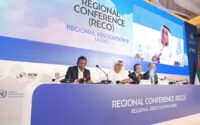Masdar And PwC Middle East Launch Report On ‘Accelerating Renewable Energy Investment In West Africa’ At ADFW
Abu Dhabi Future Energy Company (Masdar), the UAE’s clean energy powerhouse, and PwC Middle East have partnered to highlight the renewable energy potential of West Africa and the necessary reforms to increase private sector investment, with the new report “Accelerating Renewable Energy Investment in West Africa”.
Launched ahead of COP28 at Abu Dhabi Finance Week (ADFW), the report reaffirms the importance of advancing the renewable energy transition in West Africa to ensure adequate and affordable access to clean electricity and encourages policymakers to realise the investment required for the energy transition in the region.
Key findings from the report include: West Africa has an unexploited renewable capacity potential of 2,000GW, the region’s energy sector needs renewal and decarbonisation, pro-investment policy coupled with renewable energy technologies could transform the sector and meet urgent social and economic needs, and sovereign wealth funds could play a big part in driving investment to the region’s renewable energy sector.
Despite West Africa’s potential renewable capacity, the region has one of the lowest electrification rates, according to a 2023 World Bank report. Approximately 220 million people in the region live without access to power, coupled with some of the highest electricity costs in sub-Saharan Africa.
The report highlights that addressing this paradox is essential for unlocking social and economic growth in West Africa, introducing ways to decouple market risks from regional risks, enabling major funding stakeholders to play a role in closing the energy access gap.
As the demand for energy services in Africa grows rapidly with rising population levels, addressing existing barriers to clean energy investment and promoting capital deployment across the continent is urgently needed. This will increase affordability and bridge the energy gap, stimulating economic growth and accelerating progress towards the global effort to keep global temperature rises below 1.5C.
Speaking on the bankability of renewable energy projects in frontier markets, Mohamed Jameel Al Ramahi, CEO of Masdar, said, “If the African economy is to multiply its renewables capacity 40 times by 2050, as this report recommends, then we are in a race against time. We need to rapidly accelerate the flows of climate finance into the renewables space in Africa – bringing together public, private, and development capital to unlock the continent’s incredible potential.
“We believe that Masdar has a key part to play in this effort, and indeed, we are already well-established as a major player in Africa. We are grateful to PwC Middle East for partnering with us in highlighting the potential of the West African renewable sector, and the regulatory reform that is required to drive investments.”
Carlos Mendes, Capital Projects Partner, PwC Middle East, said, “We are proud to collaborate with Masdar on this paper, which we believe will be a critical step towards creating pathways to foster renewable energy ecosystems in West Africa. The region has significant untapped potential in alleviating the energy shortage and we are hopeful that the paper will encourage policy reforms in the near future, enabling the bankability of Renewable Energy projects in the region and decoupling them from the country risk rating.”
Masdar, the UAE’s clean energy champion, is advancing the development and deployment of renewable energy across the world, including in Africa through the commitment of funding for 10GW of renewable energy facilities by 2030.
Senegal, where Masdar’s investment in the Parc Eolien Taiba N’Diaye wind farm has seen clean energy delivered to over 2 million people, is cited in the report as a potential hub for green energy exports to its neighboring countries, provided that there are further regulatory and market reforms in place. The report also explores the role of Sovereign Wealth Funds (SWF) to drive investments in West Africa’s renewable energy sector and the establishment of bankability accelerator ecosystems with SWF support.
Established in 2006, Masdar is active in more than 40 countries with a total electricity generation capacity of more than 20GW. It has invested, or committed to invest, in worldwide projects with a combined value of more than US$30 billion with ambitious growth plans to reach 100GW and 1 million tonnes of green hydrogen by 2030.









